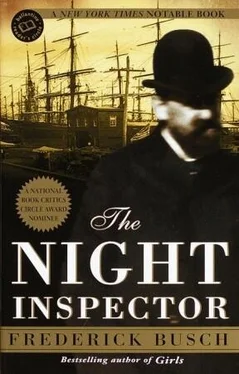He gathered the skirts of his great, long coat, and he climbed slowly out of the moored boat and turned to us. “The Hudson is a thoroughfare, and crowded with traffic often enough. There are pleasure-seekers, believe it or not, who paddle canoes upon her, and vessels of commerce coming down to us from Albany and Troy, and returning north with passengers and goods. That stubby, terrible craft with her cargo of the dead will be discovered in hours. In a moment, perhaps. What will we need to say to the authorities, if ever asked?”
He took a step, and seemed about to stumble, but he caught himself as, I knew, he had been dragging himself upright for so many years. He shook his head, and of course no one might descry whether it was the elements in the air or the tears from within him that so made his dull eyes, this only time, appear to shine.
“And the black-skinned babies,” he said, moving his arms as if to indicate them, “and the girl with the cinnamon skin, murdered by her murderous plotting. No one vouchsafes that she won’t soon be found. Nor that those dreadful wooden envelopes containing their shrunk and deathbound seeds will not be opened on the morrow, shipmates and friends. How to account to the world for all this death strewn in and under and through its waters? How to answer to the dreadful shipment that’s landed all too soon along our shore? Nothing I know of in a long, dreary life will do. It will not do. It never will do.”
He seemed about to speak once more, but his arms lifted and dropped, the heavy skirts of his oilskins flapped and lay still, and his chin was down, an instant, upon his breast as it rose and fell with a futility. He raised his right arm, as if to wave us farewell or to bless us, and he turned toward the steps and moved off in the direction of his office. He would make as if to have been there all the night, and, as he did, he would retrieve a cached bottle of gin, and he would put it to work.
And Sam would soon pack his bag at the Astor and entrain for New England, while I would find myself, days hence, in the office of Lapham Dumont, badgering him for copies of the documents I had required he create — evidence, of course, which I must destroy against the discovery of the lighter, or Jessie’s corpse, or those of the other children, buried alive in great casks by the merchants on whose behalf Jessie had duped me, and I had duped M, the merchants for whose calculations she had perished. As Dumont watched me from his straight-backed oaken chair, I swept through his disheveled files and through the drawers and cubbies of his desk.
“You have hidden nothing?”
“I wish nothing to connect me to your … business,” he replied, “whatever it might be.”
“And I to you. I have withheld my participation in the matter and know nothing of its consummation. Do you understand?”
“No, sir. I do not wish to. May I go so far, without prejudicing your goodwill, as to pretend to never having heard of you?”
“If you would. And I, for my part, hereby forgive your debt.”
“Forgive?”
“Wholly. I will devise an instrument, I will sign it, and I will cause it to be delivered to these offices. You have wagered and lost on bearskins at my expense. As far as you are concerned, I am as good as dead. If you renege in any manner on our understanding, it is you who will be so good.”
He laved his red face with his hands as I have seen a raccoon, at the side of a stream, wash his muzzle. Sighing, he raised his head from the protection of his fingers. “May I say,” he ventured, “that I would believe it only from you — the equation of death with the good. Still: forgiven!” His face reflected his disbelief, as if, instead of the William Bartholomew with whom he had conducted business in the past, he thought me somebody else.

THE SECOND DAY, THEN, OF 1868, AND MY PARTIAL investment, the English author, Mr. Charles Dickens, having come to New York to read from his works in December, and having read at the plymouth Congregational Church in Brooklyn to great acclaim several times, now was about to mount the stage in the Steinway Hall on East Fourteenth Street to offer a program that seemed to me far too long. I sat in a box with Sam, who had come down from Boston; we were far to the rear, and while Sam whispered about the prominent men and women he recognized, I employed my telescope, untouched since the War.
It was, as the newspapers would declare the next day, a gala, and celebrated personages abounded. Mr. and Mrs. Fields, who were book publishing people, Sam said, were in attendance. “Mrs. Fields will remain in her seat, while her husband will shortly walk around backstage to offer his support. I have seen this in Boston. He is Dickens’s publisher, Billy, although it is the wife, I have heard, at whom Mr. Dickens enjoys directing his attentions.”
I pointed out Mr. and Mrs. John Bigelow, he the diplomat and partial owner of the New York Post . Nearby, far down front, were Horace Greeley and William Cullen Bryant. A fellow with a broad, ferocious mustache sat near Mr. Bryant; he was with a woman of remarkable beauty. “Twain!” Sam said. “He is called Mark Twain, he wrote of the life in the gold fields, and he is on the rapid rise.” Sam’s voice expressed no little envy.
The women wore opulent gowns, and there was much décolletage and jewelry in evidence. The men were dressed, for the most part, in evening suits and boiled shirts, many with diamond studs down the front. I could smell the oily smoke of expensive cigars on their clothing, and the perfume on the warmed skin of the women made a sharp, sweet contrast to the odor of tobacco and — it is inevitable on a cold evening in the city — to the slightly sour smell of the damp wool fabric of their overcoats. They stood, many of them, for as long as they could, so as to see who was present that night and, of course, to also be seen. I sat back in the shadows and looked out with my glass into the rosy light of the hundreds of gas lamps that glowed upon the gold leaf and paint of the ceiling, the molded plaster and carved mahogany of the walls.
It was a happy sound, the hubbub of those voices, and the clothes and jewelry made for a gladsome sight. It had nothing to do with how we lived in the Points, and it was the beginning — I could feel its pulse in the Steinway Hall, and I had sensed it in my accountings of profit and loss: The nation, that New Year’s Eve, was commencing to gather itself, and great wealth was in the offing. The result would be named the Gilded Age, and the fellow with the bristling mustache and the angry expression would be said to have chronicled its rise.
The lighting was adjusted, and the audience took their place. Two thousand and five hundred seats were full — he would carry away from New York several hundreds of thousands of dollars — and Mr. Charles Dickens came striding onto the stage. He was smaller than I thought a world-famous writer might be, and I could see the lines of pain about his mouth, as well as the subtle drag of his right foot, as if he bore a wound. His suit was a light gray, with a muted pattern in the weave, and his waistcoat was a bright red silk. As the applause rolled up and the lights came further down, he lifted his head as if to listen to the language in a song. He smiled, and they clapped harder, and several cheered.
He read that night from his David Copperfield —“It is the story of a writer,” Sam whispered joyfully — which at first seemed persuasive when he spoke of a childhood visit to someplace called Yarmouth Sands, but then a sentimental notion of a sailor or shore-dwelling man spoke in an indecipherable accent and with overmuch servility about a person called Em’ly, whose importance to the story I discerned only with some difficulty. I could not help but compare this sailor to those created by M, who seemed to bear a greater dimension and a more philosophical heft.
Читать дальше













